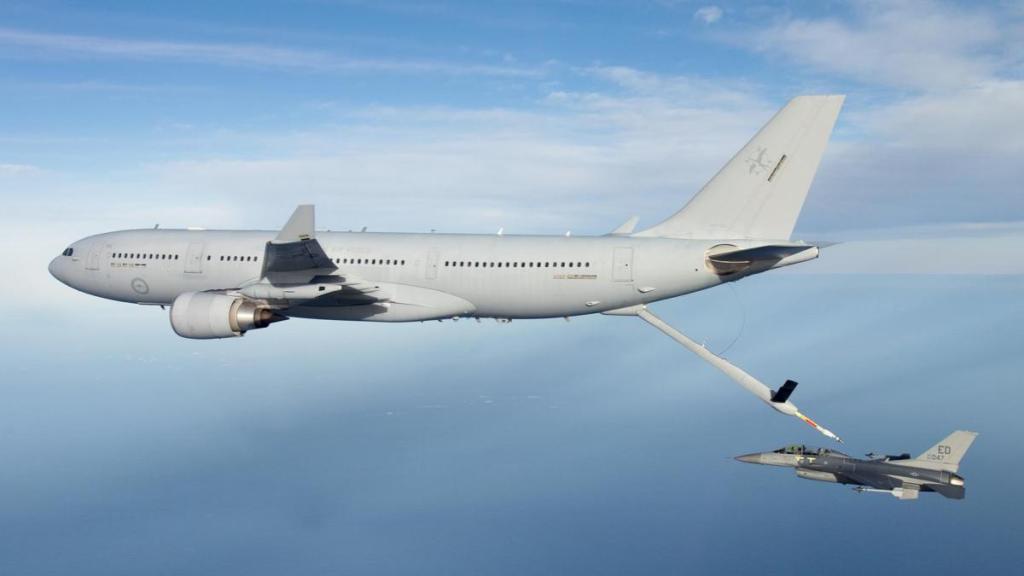In a major leap forward for bilateral defence cooperation, Australia and India have signed an agreement enabling the Royal Australian Air Force (RAAF) and the Indian Armed Forces to conduct air-to-air refuelling operations.
This arrangement, announced on November 21, during talks between Australian Minister for Defence Industry, Pat Conroy, and Indian Defence Minister Shri Rajnath Singh, is set to significantly enhance the operational capabilities of both nations’ air forces.
About the agreement
Under the new agreement, RAAF’s KC-30A Multi-Role Tanker Transport aircraft will provide air-to-air refuelling to Indian military aircraft. The arrangement comes on the heels of the November 19, signing of a similar agreement during the Australia-India Air Staff Talks in New Delhi, overseen by Air Vice-Marshal Harvey Reynolds, Deputy Chief of the Australian Air Force. This marks a significant milestone in the defence relationship between the two countries.
“India is a top-tier security partner for Australia, and through our Comprehensive Strategic Partnership, we are continuing to prioritise practical and tangible cooperation that directly contributes to Indo-Pacific stability,” said Air Vice-Marshal Reynolds, emphasizing the importance of the new cooperation.
The refuelling agreement not only boosts the capability of both air forces but also enhances interoperability, enabling more effective cooperation in the Indo-Pacific region. “The ability to conduct air-to-air refuelling with the Indian Armed Forces elevates our interoperability and enables us to cooperate more effectively in a range of different scenarios,” Reynolds added. This cooperation will also facilitate joint operations and exercises, further strengthening the ties between the two nations.
Beyond air refuelling, RAAF has been actively engaging with the Indian Navy’s P-81 Neptune surveillance aircraft, and this new agreement is expected to support extended operational reach and persistence in the region. By refuelling the P-81, India will have enhanced surveillance capabilities, critical for maintaining security in the strategic Indo-Pacific region.
Defence collaboration at the G20 Summit
This agreement comes at a pivotal time, following the 2nd India-Australia Annual Summit held on November 19, in Rio de Janeiro, on the sidelines of the G20 Summit. During their meeting, Prime Minister Narendra Modi and Australian Prime Minister Anthony Albanese reaffirmed their commitment to deepening their defence and security cooperation. This summit built upon the first-ever Annual Summit in March 2023, during Prime Minister Albanese’s visit to India.
Both leaders expressed satisfaction with the growing defence ties between their countries. “Through our Comprehensive Strategic Partnership, we continue to build on shared values and interests, particularly in defence and security,” Prime Minister Modi said during the meeting. They highlighted the significant progress made in strengthening bilateral defence exercises, the Mutual Logistics Support Arrangement, and the increasing frequency and complexity of joint military activities.
A central topic of their discussions was the renewal of the Joint Declaration on Defence and Security Cooperation in 2025, which will further cement their strategic partnership. Both leaders are eager to align their defence strategies in response to the evolving security dynamics in the Indo-Pacific, focusing on enhancing collective security and promoting regional peace.
“We are working towards a long-term vision of defence and security collaboration that will not only contribute to both our nations’ security but also foster stability in the Indo-Pacific,” Prime Minister Albanese stated.
Shared maritime and defence priorities
According to the Joint Statement issued at the end of talks, the two leaders also agreed to deepen their maritime security cooperation, agreeing to develop a joint maritime security collaboration roadmap. They underscored the importance of reciprocal defence information-sharing and improved maritime domain awareness, critical for addressing shared regional challenges, particularly in light of rising tensions in the Indo-Pacific.
Additionally, the leaders discussed enhancing defence industry ties, particularly in the maritime sector. The participation of Indian defence industries in Australian defence expos, such as the Indian Ocean Defence & Security 2024 Conference in Perth, marks a significant step towards greater collaboration in defence research and technology. They also emphasized the potential for increased cooperation between the defence industries and start-ups of both countries.
Both sides are enthusiastic about the future of this partnership, which they believe will set a new standard for regional security cooperation. The leaders are committed to fostering a secure, stable, and prosperous Indo-Pacific region, grounded in respect for international law and an open, inclusive security architecture.
A vision for a secure Indo-Pacific
Both Prime Ministers reaffirmed their shared commitment to a peaceful Indo-Pacific region, focused on promoting stability, economic growth, and respect for international norms. The new air-to-air refuelling agreement, coupled with the discussions held at the G20 summit, illustrates the continued strengthening of the India-Australia defence and security partnership.


